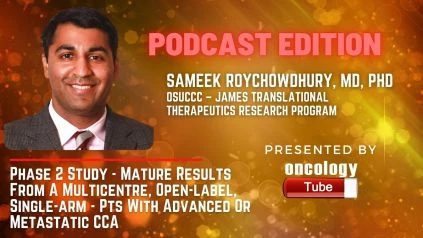Sameek Roychowdhury, MD, Ph.D., a medical oncologist, and researcher with the OSUCCC – James Translational Therapeutics Research Program speaks about Infigratinib (BGJ398) in previously treated patients with advanced or metastatic cholangiocarcinoma with FGFR2 fusions or rearrangements: mature results from a multicentre, open-label, single-arm, phase 2 study.
Link to Study:
https://www.sciencedirect.com/science/article/abs/pii/S2468125321001965
Conclusion –
Brief history:
After advancement on first-line gemcitabine-based therapy, individuals with advanced cholangiocarcinoma have few treatment alternatives. In 10–16 percent of individuals with intrahepatic cholangiocarcinoma, FGFR2 fusions or rearrangements are found. Infigratinib is a fibroblast growth factor receptor inhibitor that is selective and ATP-competitive. The researchers wanted to see if infigratinib had an antitumor effect in patients with locally progressed or metastatic cholangiocarcinoma, FGFR2 mutations, and previous gemcitabine treatment.
Methodologies:
Patients were recruited from 18 academic centers and hospitals in the United States, Belgium, Spain, Germany, Singapore, Taiwan, and Thailand for this multicenter, open-label, single-arm phase 2 trial. Participants required to be at least 18 years old, have histologically or cytologically proven, locally progressed, or metastatic cholangiocarcinoma with FGFR2 fusions or rearrangements, and had received at least one gemcitabine-containing regimen previously. Patients were given 125 mg of oral infigratinib once a day for 21 days in 28-day cycles until disease progression, intolerance, consent withdrawal, or death. A CT or MRI of the chest, abdomen, and pelvis was used to evaluate the radiological tumor at baseline and every 8 weeks until disease progression. The primary endpoint was the objective response rate, which was defined as the percentage of patients who had a best overall response of a confirmed complete or partial response as determined by a blinded independent central review (BICR) using Response Evaluation Criteria in Solid Tumors, version 1.1. The full analytic set, which included all patients who received at least one dosage of infigratinib, was used to look at the primary result and safety. This study has been registered with ClinicalTrials.gov with the number NCT02150967, and it is still running.
Observations:
122 patients were enrolled in our study between June 23, 2014, and March 31, 2020, with 108 having FGFR2 fusions or rearrangements receiving at least one dose of infigratinib and making up the whole analysis set. The BICR-assessed objective response rate was 231% (95 percent CI 156–322; 25 of 108 patients) after a median follow-up of 106 months (IQR 622–156) with one confirmed complete response in a patient who solely had non-target lesions diagnosed at baseline and 24 partial responses. Hyperphosphataemia (n=83), stomatitis (n=59), tiredness (n=43), and alopecia (n=41) were the most common treatment-emergent adverse events of any grade. Dry eyes were the most prevalent ocular toxicity (n=37). 18 (17%) patients had central serous retinopathy-like and retinal pigment epithelial detachment-like events, with ten (9%) having grade 1, seven (6%) having grade 2, and one (1%) having grade 3. There were no deaths as a result of the treatment.
Assessment:
In previously treated patients with locally advanced or metastatic cholangiocarcinoma with FGFR2 gene fusions or rearrangements, infigratinib has shown to have good clinical activity and a manageable adverse event profile, and so represents a viable new therapeutic option in this situation.

